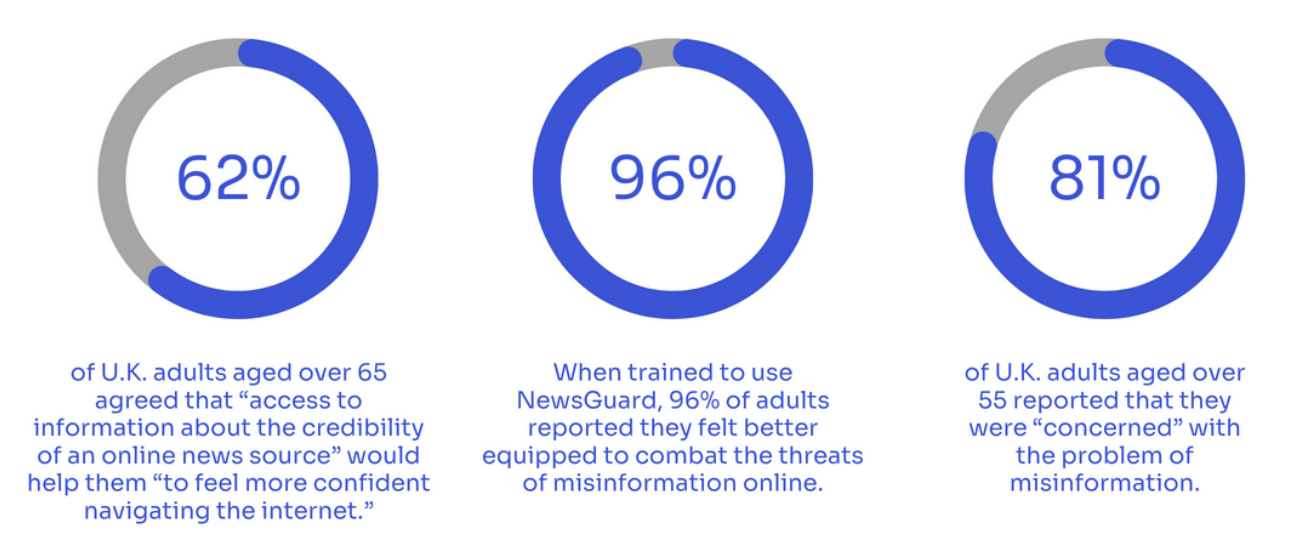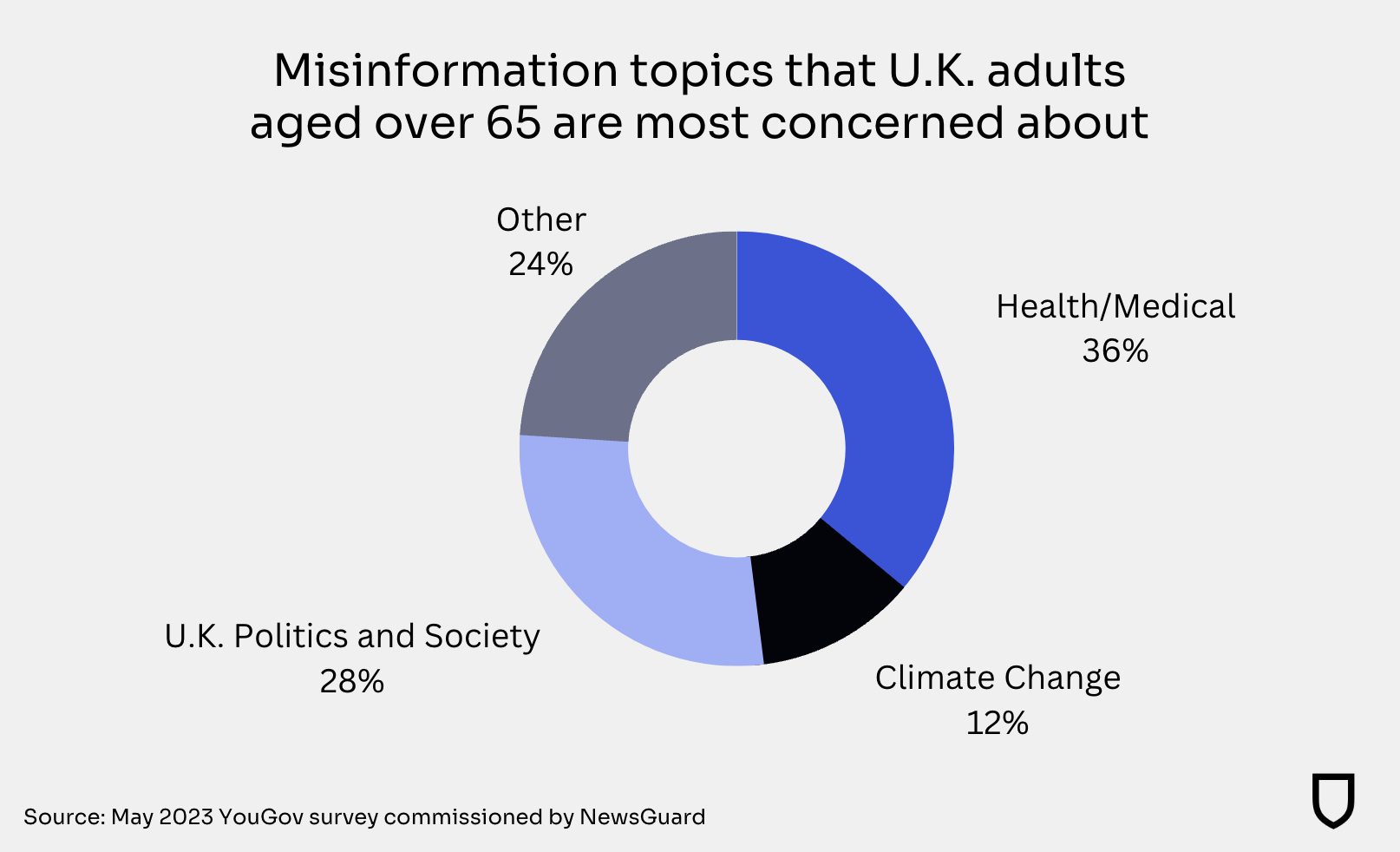Perspectives of those working in digital inclusion and/or aging-focused organizations
NewsGuard spoke with various digital inclusion and ageing-focused support groups and volunteers for their views on the issue of misinformation and older populations, based on their proximity to caring for older people and knowledge of their concerns and challenges. NewsGuard issued a survey to these groups, and conducted a focus group in July 2023. Our key findings were:
Some people think older people are particularly vulnerable to misinformation and need support
Nick Moylan, Training and Development Adviser at Digital Communities Wales, a Welsh government digital inclusion project, told NewsGuard during a July 2023 online focus group, “we know from statistics that there are more skills gaps in older people’s engagement with online tools. This impacts their confidence levels when interacting with a news site or social media. There’s the nervousness of dealing with these sites, plus all the tools and skills you need to navigate all the information on there. Because of that, it can be easy to get drawn into discussions, misinformation.”
Conor Chipp, Digital Inclusion Advisor at Digital Communities Wales, said, “Anecdotally, older people do fall victim to misinformation. It comes down to lack of confidence or fear – they’ve spent most of their lives with trusted news sources, and they’re being presented with news articles that could’ve come from anywhere. It can be scary when these polarizing things written as fact pop up, without the digital skills to verify them.
Alex, Community Digital Champion at U.K. digital inclusion charity Citizens Online, said: “I think that older people are especially vulnerable to misinformation … The emergence of AI platforms can also contribute to misinformation, and while certain software like ChatGPT can be a helpful and fun tool, it is prone to inaccuracies that a lot of older people may not realise. When it comes to making decisions, from online safety to elections, I believe it is crucial that older people know how to spot misinformation and are not being misled.”
An anonymous respondent said, “‘[Older people] shouldn’t be forgotten about or left behind as they didn’t grow up with technology. They need to be taught how to spot misinformation in various settings, online and in person, podcasts, etc.”
A Digital Champion Coordinator at Citizens Online who preferred not to be named, said: “It is difficult for older people to make informed decisions, as they do not know which information source to trust.”
Others believe that older people are no more likely, or even less likely to be impacted by online misinformation
Angela Jones, Digital Inclusion Advisor at Digital Communities Wales, said that younger people are much more likely to use social media as a trusted news source than older people and are therefore “at just as much risk.”
Some members of Digital Communities Wales said that older people are less at risk from misinformation because they may spend less time online and tend to be more cautious when they do. Ruari McLaren, Digital Inclusion and Skills Trainer at Digital Communities Wales, said, “given that older age groups are less likely to have all the digital skills, they’re less likely to be affected by misinformation because they’re being exposed to less of it, they’re going to those spaces less than the ‘TikTok generation.’”
Conor Chipp at Digital Communities Wales, agreed, saying “older people can be hyper cautious because of their [lower] confidence level, so they are less likely to go for clickbait or phishing scams.”
Concerns about misinformation go beyond traditional social media
Anna Dolphin, Coordinator at Digital Brighton & Hove Project, a charity that provides help with basic digital skills or support getting online, said that “misinformation may also come from sources which can be perceived as ‘safe’,” by older people, such as print news. Older people may also fail to recognize that online platforms can contain misleading information, “where anyone can present something as fact,” Dolphin said.
Indeed, NewsGuard analysts have found that health misinformation, such as about COVID-19 and vaccines, has not only gone viral on Twitter, Facebook and TikTok, but has also been repeated by some of the most widely read news publications in the U.K.
A respondent who chose not to be named said, “many older adults who do not use either email or social media sites do use WhatsApp […] Videos containing misinformation were spread widely with WhatsApp during the pandemic and spread fear, confusion and anti-vax messaging which may have encouraged some not to take up their vaccines.”
Digital inclusion has been a key focus of digital education for older people
In a video call with NewsGuard in May 2023, Age UK’s digital inclusion Programme Manager highlighted that a quarter of older people in the U.K. face digital exclusion. In other words, they are not online and are consequently excluded from the benefits that the online world can bring. Therefore, a key priority for Age UK is to help older people who are able and want to get online to learn to use the internet in the way that they need, whether that be staying in touch, finding out information or managing their money online. For those who can’t get online, these services also need to remain available and accessible offline.
They told NewsGuard that as news and essential services such as health and banking services increasingly move online, older people are more likely to need to use technology to access information. “If less news is available offline, more older people may have to access news online … Many of these people will not be as skilled or confident navigating the internet, and the need for digital literacy and media literacy skills will become more important.”
Media literacy skills training can pose unique challenges, and better resources are needed
In a video call with NewsGuard in July 2023, Ruari McLaren, Digital Inclusion and Skills Trainer at Digital Communities Wales, said that a media literacy skills session can become contentious, as people disagree about what constitutes a trustworthy source. Nick Moylan, Training and Development Adviser at Digital Communities Wales, said that teaching media literacy skills “can be quite polarizing.”
Members of Digital Communities Wales agreed that while teaching these skills is vital, there are not enough resources available to those supporting older people. Nick Moylan noted, “it doesn’t feel like there are any resources out there that are relevant and reliable for the U.K..”
The respondents said that using more examples of relatively inconsequential misinformation could help to remove the fear and possible contention around the subject of misinformation. They told NewsGuard that their existing resources included a fake video allegedly showing flying penguins, to highlight that false information can appear convincing, and does not always have serious consequences. “This video takes away the stigma from sharing misinformation. It shows it can be something as inconsequential as flying penguins,” Conor Chipp, Digital Inclusion Advisor at Digital Communities Wales, said.
Kirsty Wallace, a Digital Inclusion and Skills Trainer at Digital Communities Wales highlighted the need to create judgment-free spaces, where people can ask any kind of question “no matter how silly”, and tell stories about sharing misinformation “to show that it’s not something to be embarrassed about, just something to be aware of.”
Moylan suggested that groups supporting older people to stay safe online create interactive resources, such as a web page that would demonstrate how deceptively professional and credible misinformation can appear. The web page would provide a “safe learning environment” that presents “the issues around a misleading news article,” Moylan said.
More accessible resources are needed to help users with NewsGuard’s browser extension
Finally, various members of Digital Communities Wales suggested that NewsGuard develop more resources to help users use its browser extension, particularly to help digitally excluded people, who may struggle more to install and use the technology.
Asked about his experience introducing people to the NewsGuard browser extension, Moylan noted that some people expressed concern about the reliability of NewsGuard’s assessments of news sites. “Some people ask, how can we trust it?” he said. (NewsGuard’s full methodology for rating news sources is published on its website, along with an extensive frequently asked questions section for the public to review. NewsGuard also publishes feedback from publishers it receives—positive and negative—and always calls for comment when rating news sources).
Reflecting on Digital Communities Wales’ comments, NewsGuard will produce resources to help users less accustomed to using technology to download and use the browser extension, and offer users the option of directly requesting specific Nutrition Labels from our team to review. These resources will be specifically designed to be used by more vulnerable populations with larger text and simpler instructions, and will also highlight NewsGuard’s methodology and editorial independence, to help users to feel better able to trust the ratings. The resources will be provided at no charge to the ageing and digital inclusion companies that NewsGuard has partnered with over the course of this project.
Future challenges in fighting misinformation: AI
Members of Digital Communities Wales expressed concern that capabilities in Artificial Intelligence will pose a great challenge to protecting people from being misled online. “Misinformation now is going to be nothing compared with what we’ll see in terms of, for example, the ability to clone voices. We’re entering a whole new world of it. The ability to discern if an image is real or not, will be a battle in technology.”

